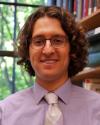View descriptions of the areas of study these faculty supervise at the graduate level.
Graduate Faculty

Jordanna Bailkin
Professor, Jon Bridgman Endowed Professor in HistoryGraduate Studies Description
Division: Europe--Medieval to Modern Times
Students may work with Professor Bailkin in modern British history. A field in British history would include the social, political, and cultural history of Britain (including Ireland) and Empire from the eighteenth century to the present. Students will develop subfields on major historiographical questions such as the development of the welfare state, race and immigration, urban identity, gender and the family, "four nations" approaches to British history, and the impact of decolonization on the metropole.
Required course work for a first field in modern British history includes completing HSTRY 590 as well as two supervised directed readings.
For those selecting modern Britain as a second field, HSTRY 590 is required, plus one supervised directed reading.
For those selecting modern Britain as a third or fourth field, HSTRY 590 is recommended. Depending on research and training needs, a directed reading may be substituted.
Division: Comparative History (Comparative Colonialisms)
Students pursuing a field in Comparative Colonialisms will examine a variety of colonial histories: typically, British, French, Spanish, Dutch, German, and American. We will consider the relationship between "white" and "non-white" colonies as part of the larger racial politics of colonialism. Although the emphasis is usually on European colonial histories, I have worked with a number of students who are interested in U.S. imperialism, and can tailor the field accordingly.
Students who are selecting Comparative Colonialisms as a second field are required to take HSTRY 590 when available, plus one supervised directed reading.
Students who are taking Comparative Colonialisms as a third or fourth field are strongly encouraged to take HSTRY 590, and required to undertake one supervised directed reading.

Arbella Bet-Shlimon
Associate ProfessorGraduate Studies Description
Division: Africa & the Middle East
Modern Middle East: In this field, students will aim to develop general proficiency in the political, social, and economic history of the Middle East—currently conceived as the Arab World, Turkey, and Iran, and more broadly conceived as Southwest Asia and North Africa—from the 19th century to the present. This field will focus on the following topics: nation building, state formation, and associated political discourses; Western colonialism, neocolonialism, and neoimperialism in the Middle East and North Africa; the decline and fall of the Ottoman Empire; the formation and influence of key ideologies such as Arab nationalism, Sunni and Shiite Islamisms, and Zionism; wars, diplomacy, and refugee crises; and coups and revolutions. Students are expected to demonstrate familiarity with historiographical trends in the study of the modern Middle East in addition to an understanding of historical events and themes.
Division: Comparative History (Comparative Colonialisms)
Comparative Colonialisms in the Modern Middle East: In this field, students will examine the various forms that colonialism and imperialism have taken in the Middle East (Southwest Asia and North Africa) since the 19th century in comparative perspective. Topics to be covered include: the growth and decline of American, British, French, and Portuguese imperial enterprises in the Middle East; the League of Nations and the mandate system; British protectorates in the Persian Gulf region; empires centered in the Middle East region, such as the Ottoman Empire and Oman; settlements and expulsions; and the development and decline of monarchies.

Elena I. Campbell
Associate ProfessorGraduate Studies Description
Division: Russia and Central Asia
Professor Campbell's current research interests concern empire, religion and nationalism in late Imperial Russia.
A graduate field will include a variety of topics in Russian history from the 18th to the early 20th centuries. The content of the field and the specific focus of graduate study will be determined through consultation with the professor.
Students will be expected to read major works in Imperial Russian history and be familiar with the current state of the field. Students who are choosing Russian history as their primary area of study must acquire a reading knowledge of Russian and any other language relevant to their research.

Purnima Dhavan
Associate Professor, Associate Chair, Giovanni and Amne Costigan Endowed Professor in HistoryGraduate Studies Description
Division: Asia--Pre-History to the Present
Early Modern South Asia
Graduate students preparing a field in the history of South Asia 1200-1800 will be expected to gain a broad familiarity with the history of the Sultanate and Mughal period in addition to the histories of various regional dynasties. The social, cultural, and political history of the period is emphasized and includes state formation and the emergence and transformation of caste and ethnic identity, religious traditions, warrior and peasant cultures, trading networks, and intellectual traditions.
Students will create a specialized course of study in consultation with the professor. Proficiency in one South Asian language and/or Persian is required for students who wish to pursue a primary specialization in this field. Students who select this as a secondary field need not have knowledge of a South Asian language.
Required course work for a first field in this area includes completing HSTAS 502 and 590 and two supervised directed readings in coordination with the HSTRY 596-7 paper. One will focus on reading primary sources in the original languages.
For those selecting Early Modern South Asia as a second field, HSTAS 502 is required. Two additional directed readings will also be required, one connected to the applicant’s regional/linguistic focus and the other in Historiography.
For those selecting Modern South Asia as a third or fourth field, HSTAS 502 is required. Depending on research and training needs, a directed reading (HSTRY 600) will also be supervised by Prof. Dhavan.
Proficiency in one South Asian language and/or Persian is required for students who wish to pursue a primary specialization in this field. Students who select this as a secondary field need not have knowledge of a South Asian language.
Division: Comparative History (Historiography & Comparative Gender)
Students preparing a field in Historiography will study the impact of modern historical theories and methodologies on our understanding of early modern South Asian history including nationalist, feminist, marxist, and subaltern modes of analysis. The course of study in the field will also explore oral traditions, mythological concepts of time, memory and history in textual sources and art from the early modern period.
A field in Comparative Gender in South Asia from 1200-1800 will examine the construction of gender in early modern South Asia and its specific interactions with caste, social class, and ethnicity. Readings will focus on the construction of gender in courtly, warrior, ascetic, and mystical traditions in the early modern period as well as the considerable body of theoretical and methodological debates about the history of gender put forward by modern scholars.

Madeleine Yue Dong
Professor, Joint Appointment: Jackson School of International StudiesGraduate Studies Description
Division: Asia--Pre-History to the Present
Students preparing this field will consider China in the late nineteenth and twentieth centuries, including social, cultural, gender, urban history.
Division: Comparative History (Comparative Gender & Comparative Ethnicity & Nationalism)
Students preparing a field in Comparative Gender will consider the transformation and reconstruction of gender boundaries and identities through political, social, and cultural discourses and practices. Students preparing a field in Comparative Ethnicity and Nationalism will study China from an empire to a nation state, and formation/transformation of regional, ethnic, gender, and class identities in the process, as well as Chinese nationalism and revolutions and their relations to imperialism and colonialism.

James Felak
Professor, Newman Center Professor in Catholic ChristianityGraduate Studies Description
Division: Europe--Medieval to Modern Times
Students choosing East European History as their primary area of study will cover the lands and peoples of the region roughly comprising today's Poland, Hungary, Czech Republic and Slovakia from 1780 to 1989, and the Balkans from 1804. Students are required to take a graduate field course on Modern Eastern Europe, a 400 level survey on the history of Eastern Europe, and at least one quarter of directed readings. Such students must also acquire a reading knowledge of two European languages pertinent to their study, one of them an East European language not including German or Russian.
Students doing East European History as a secondary area of study may choose one of the following:
- East Central Europe from 1780 to 1989
- the Balkans from 1804 to 1989
- Eastern Europe in the 20th Century
- Poland from 1772 to 1989
- Nationalism in Eastern Europe
- Communism in Eastern Europe
- Religion in Eastern Europe
Such students must take a graduate course on Modern Eastern Europe and a 400 level survey on the history of Eastern Europe.
It may be possible to negotiate additional sub-fields as they suit student needs and interests.

Christoph Giebel
Associate Professor, Joint Appointment: Jackson School of International StudiesGraduate Studies Description
Division: Asia--Pre-History to the Present
Professor Giebel offers fields covering the material and human history of Viet Nam from the beginnings to the present. Students focusing on the period before 1800 will emphasize local cultures and early kingdoms through the study of religion, architecture, art, archaeology, economics, ecology, and textual studies (literature, laws, chronicles, and oral traditions). Students working in the modern period will focus on the social, political, cultural and economic changes in Viet Nam from 1800 to the present. Emphasizes the growth of staes, imperialism, nationalism, the transformations of modernity, independence and the challenges of gendered, ethnic, and religious identities in the post-colonial world.

Susan A. Glenn
Professor, Samuel and Althea Stroum Chair in Jewish StudiesGraduate Studies Description
Division: United States History
Students may emphasize the cultural and/or social history of the U.S. in the long twentieth century (since the l870s). Topics of study include immigration and ethnic group life, social and political movements, women and gender, race relations, expressive and popular culture.
Division: Comparative History (Comparative Gender & Comparative Ethnicity & Nationalism)
A field in comparative gender with Professor Glenn will emphasize the history and historiography of gender and women's history. Areas of study include the relationship between gender and race, ethnicity, nationalism, class, and social movements as well as the significance of gender ideology in the production and consumption of expressive and popular culture. Comparisons will focus on the U.S. and another geographic area (in conjunction with another faculty member).
Students may also work with Professor Glenn on a sub-field of Comparative Ethnicity and Nationalism with a focus on Jewish history/identity/ethnicity; Jews, Blacks, and the racial imaginary in the American and European contexts..

James Gregory
ProfessorGraduate Studies Description
Division: United States History
My graduate teaching fields are tailored to the individual interests of students. We will work out precise subject areas and reading lists as we proceed. Subject to those negotiations, students generally choose one of the following concentrations:
Twentieth Century U.S.
I prefer to treat this as a broad field that covers the full chronological sweep of the century. Students will read widely, developing a modest familiarity with the literature on a large number of subjects (including politics, culture, foreign relations, race, gender, labor, region, urban). Depending upon interests, certain issues and time periods will be developed in more depth.
Class, Race, Labor, and Political Economy
This concentration joins the subject of American political economy with those of labor history and race/ethnic formation covering both the 19th and the 20th centuries.
Regions, Migration, Immigration
This concentration explores place and mobility in American history with readings that examine how place identities and regional political economies have been formed and maintained and how migrations (both from abroad and internal) reshape places and people.

Liora Halperin
Professor , Joint Appointment: Jackson School of International StudiesGraduate Studies Description
Division: Africa and the Middle East
Students may work with Prof. Halperin to develop a field focused on the history of Modern Israel/Palestine. This field will situate Palestine/Israel within both Middle East and Jewish historiography, with the particular emphasis depending on the student’s research and teaching objectives. It will draw together works in both Israel Studies and Palestine Studies, pertaining to cultural, economic, social, political, and intellectual history.
Division: Europe, Africa and the Middle East, or Russia
Students may develop a field with Prof. Halperin on Jewish history during the Medieval, Early Modern, and Modern periods. This can be structured as primarily a Europe or Russia field or as primarily a Middle East field, but will in any case explore interrelations between these fields and, secondarily, between these fields other world regions. This field may examine the evolution of relations between Jews, Christians, and Muslims; Jews and the state; forms and challenges of emancipation; commercial networks; cultural, linguistic, and social history; the history of anti-Judaism and antisemitism; and Jewish contact with and entanglements with colonial and imperial projects.
Division: Comparative History (Comparative Colonialisms)
Students may develop a field with Prof. Halperin that explores variants of modern colonialism in global perspective; the interplay of colonialism, civic nationalism, and ethnonationalism; the economic history of empire; and the emergence of the field of settler colonial studies.
Division: Comparative History (Ethnicity and Nationalisms)
Students may develop a field with Prof. Halperin exploring modern ethnonational movements in comparative perspective with particular emphasis on Europe (including Eastern and South Eastern Europe), the Middle East, and South Asia. This field may integrate readings on language revival efforts, cultural movements, anti-imperial nationalisms, and the emergence of the nation-state system and concepts of autonomy, minority rights, partition, and migration.

Bruce Hevly
Associate ProfessorGraduate Studies Description
Division: History of Science
History of Science
A general field, designed to begin preparation of graduate students aiming to teach undergraduate courses or pursue research in history of science during their careers, and to introduce the general historiographical framework and development of the field. The field can be modified to meet the student's particular interests. This would normally be the second field for students interested in becoming historians of science.
Science and Technology Studies
"STS" engages in the variety of new approaches to understanding the sciences which have emerged in the wake of Thomas Kuhn's Structure of Scientific Revolutions (1962). Drawing from diverse academic disciplines, such as philosophy, sociology, and anthropology, scholars in the 1970s and 80s developed powerful and controversial new methods of analyzing science as a social construction or network, and critiqued the role of gender and race in scientific practice, theory, and organization. More recently, cultural and anthropological studies of science have presented new means to interpret science alongside alternative systems of human (and even 'non-human'!) action and belief. Postcolonial studies of science and technology have traced science's interactions with empire, development, and indigenous knowledges. Students taking this field will engage with these diverse approaches of recent STS through reading, writing, and discussions. A knowledge of the tools and concepts of STS has been indispensable for recent history of science, and the field will deepen and broaden participants' perspectives on science.
History of Technology
A general field, designed to begin preparation for graduate students aiming to teach undergraduate courses or pursue research in history of technology during their careers, and to introduce the general historiographical frameworks and development of the field. The field can be modified to meet the student's particular interests; in the past, students interested in environmental and western history have been important members of the seminar.
History of Physics
Introduction to the literature, practices, and current problems in the study of the emergence and development of physics since the beginning of the nineteenth century. Professor Hevly has particular interests in nineteenth-century British and twentieth-century American cases, but other concentrations are possible as well.
History of Terrestrial Physics
This is a more specialized field, which aims to explore the history of terrestrial physics as an alternative to the standard view in history of modern physics which has focused on the reductionist program of atomic and sub-atomic sciences. Topics include various studies since the eighteenth century: terrestrial magnetism and electricity, auroral studies, glaciology and ice caps, ocean sciences, studies of the upper atmosphere. Also considers expeditionary science, and developing connections between science and state.
Science, Technology and the Military
Exploration of the institutional, cultural and conceptual relationships between science, technology and the military components of that state since the early modern period. This field centers on the modern military as a set of self-consciously technologically-conditioned communities, and on science and technology as constrained by the aspirations, commitments and structures of the modern state. Depending on the student's area of interest, the field may also be oriented towards issues of science and gender, cyborgia, space programs, or other issues of interest. Professor Hevly's particular interest is the development of intellectual systems to enlist the Earth into reliably-functioning technological systems.
Division: United States
History of Science and Technology in American Culture
This field is designed to explore science and technology in the context of American social, cultural, or intellectual history. Undertaking sufficient comparative history to justify claims about American peculiarities, the field will look for the ways in which American contexts since the seventeenth century influenced the content and construction of science and technology. It might be particularly appropriate for American historians interested in ways to integrate the history of science and technology into research and teaching programs in the broader field.

Raymond Jonas
Professor, Jon Bridgman Endowed Professor in HistoryGraduate Studies Description
Division: Europe--Medieval to Modern Times
Europe and the Modern World
This field aims to provide a familiarity with some of the great themes, problems, and events in the history of modern Europe, including but not limited to Europe’s larger global engagements. It offers a foundation for advanced study of a thematic or regional nature, a basis for comparative historical study within Europe and beyond, and preparation for the teaching of entry-level and advanced undergraduate surveys in the field.
Course work for a primary field in Europe and the Modern World includes HSTEU513 and at least two graduate level courses or directed readings under my supervision, along with appropriate language training.
Course work for a field in Europe and the Modern World that is not a primary field includes HSTEU513 and at least one graduate level course or directed reading under my supervision.

Hajin Jun
Assistant Professor, James B. Palais Professor of Korean History, Joint Appointment: Jackson School of International StudiesGraduate Studies Description
Division: Asia: Pre-history to Present
Students may work with Professor Jun in modern Korean history. The field examines the social,
political, and cultural history of Korea from the late nineteenth century to the present. Students
will develop a broad understanding of key historiographical questions related to the emergence
of Korean nationalism, Japanese colonization, colonial state and society, decolonization, and
the divergent trajectories of North and South Korea. Students will also be encouraged to
deepen their expertise in a thematic subfield relevant for their teaching and/or research.
Required course for first and second fields: HSTAS 581 and two supervised directed readings.
Students who select modern Korean history as third or fourth fields are encouraged to take
HSTAS 581, though they may opt instead for a supervised directed reading depending on their
research and training needs.
Korean-language proficiency is required for students who pursue a primary specialization in
modern Korean history.

Moon-Ho Jung
Professor, Harry Bridges Endowed Chair in Labor StudiesGraduate Studies Description
Division: United States
The field of Asian American history encompasses a broad range of topics and methodologies that often cross disciplinary and geopolitical boundaries. Students pursuing this field are expected to read widely and critically, with an emphasis on historiographical shifts and debates. In particular, they will investigate how the field has evolved over time and challenged and reproduced traditional narratives of U.S. history. Students are also encouraged to converse with a vibrant community of faculty and graduate students specializing in Asian American Studies at UW.
Division: Comparative History (Comparative Ethnicity & Nationalism)
Students will explore how race and nation have been articulated in U.S. history, framed theoretically and globally. Students may choose to emphasize particular time periods, theoretical approaches, and geopolitical frameworks as they study how racial concepts, representations, and practices shaped American national identities. Possible topics of concentration include whiteness, imperialism, labor migration, and transnational social movements.

Laurie Marhoefer
ProfessorGraduate Studies Description
A note to prospective graduate students: I will not be accepting new students as primary advisor for the 2022-23 academic year.
Division: Europe--Medieval to Modern Times
Students preparing this field with Professor Marhoefer will study the social, cultural, and political history of Germany, German-speaking Europe, and Germany’s global colonial empire from the late eighteenth century to the present.
Division: Comparative History--Comparative Gender & Comparative Ethnicity and Nationalism
A field in comparative gender directed by Professor Marhoefer will examine the transnational histories of gender and sexuality, as well as the closely related histories of class, race, and empire, especially within modern Europe and its colonies.

Mark Metzler
Professor, Joint Appointment: Jackson School of International StudiesGraduate Studies Description
Division: Asia, Pre-History to Present
A description of Professor Metzler's graduate fields is not yet available.

Matthew W. Mosca
Associate Professor, Joint Appointment: Jackson School of International Studies, Dau-lin Hsu Endowed ProfessorGraduate Studies Description
Division: Asia--Pre-History to the Present
Graduate students taking a field in Late Imperial Chinese History will develop a general knowledge of the Ming and Qing periods (1368-1912), the development of relevant historiography, particularly in English, and specialized expertise in one or more subfields. The field will cover both China and Inner Asia. A reading list will be determined in consultation with the instructor. Students for whom Late Imperial China is their primary field will be expected to command at least literary and modern Chinese in order to develop research proficiency. Students taking this as a secondary field are not required to know Chinese.

Devin E. Naar
Associate Professor, Isaac Alhadeff Professor of Sephardic Studies, Sephardic Studies Program Chair, Joint Appointment: Jackson School of International StudiesGraduate Studies Description
Division: Ancient Mediterranean & Late Antique Near East
A description of Professor Naar's graduate fields is not yet available.

Scott B. Noegel
Adjunct ProfessorGraduate Studies Description
Division: Ancient Mediterranean & Late Antique Near East*
A number of fields are possible within this division:
Biblical History
(Syro-Palestinian) Israelite history and culture within the context of the greater ancient Near East. Includes knowledge of primary biblical languages.
Mesopotamian History
History of the primary peoples and cultures of Mesopotamia from the mid-4th millennium BCE until the Hellenistic period. Includes knowledge of primary langauges of Mesopotamia.
Ancient Egyptian History
History of ancient Egypt from the mid-4th millennium BCE until the Ptolemaic period. Includes knowledge of hieroglyphic Egyptian.
History of Biblical Exegesis
This history of biblical exegesis (Hebrew Bible=Old Testament) frrom canonization until today.
History of the Semitic Languages
Comparative history of the primary Semitic languages and their dialects.
**Adjunct professors do not normally supervise first fields.

Margaret O'Mara
Professor, Scott and Dorothy Bullitt Chair of American HistoryGraduate Studies Description
Division: United States
Twentieth Century
Development of the U.S during the "very long" 20th C., from 1877 to the present, with particular emphasis on the changing relationship between state and society, economic and technological shifts, and struggles for civil and economic rights.
- For a first field HSTAA 522 is required, as well as at least one directed reading in coordination with the HSTRY 596-7 paper.
- For those working on 20th C. US as a second field, HSTAA 522 is required. Depending on the previous preparation of the applicant, an additional directed reading may also be recommended.
- For a third or fourth field in this subject a directed reading (HSTRY 600) with me is required; HSTAA 522 is recommended.
Urban History
Urbanization and the suburbanization of the U.S. from the colonial era to the present, including consideration of comparative examples. Students will read seminal works from the urban historiography and key contributions to the field from social history, intellectual history, and political history, as well as from the disciplines of urban planning, public policy, and sociology.
- Required course work for a first field includes HSTAA 590 (Urban History) or a directed reading (HSTRY 600) in urban history. I strongly encourage coordinating this supervised directed reading to occur at the same time as the first quarter of the HSTRY 596-7 seminar paper sequence.
- For a second field students should complete HSTAA 590 (Urban History) or a directed reading (HSTRY 600) in urban history.
- For a third or fourth field in this subject a directed reading (HSTRY 600) is required.
All students of urban history are strongly encouraged to take or audit one or more of the many urban-related graduate courses regularly offered in other departments and colleges, many of which can be found by consulting the database of faculty affiliates of Urban@UW (http://urban.uw.edu). Students also can work with me to identify relevant courses and faculty.
Policy and Political History
Development of the U.S. state and political culture, with particular emphasis on the 20th C. Readings will consider the role of the federal government, contested and dynamic definitions of citizenship, expansion and contraction of the national state, the role of extra-governmental institutions, and grassroots activism on the left and the right.
- Required course work for a first field includes completing HSTAA 590 (American Political History), or a directed reading (HSTRY 600) in political history. I strongly encourage coordinating this supervised directed reading to occur at the same time as the first quarter of the HSTRY 596-7 seminar paper sequence.
- For a second field HSTAA 590 (American Political History) is required, or a directed reading (HSTRY 600) with me in political history.
- For a third or fourth field a directed reading (HSTRY 600) is required.
All students of political history are strongly encouraged to take or audit one or more courses in other Social Science programs.
History of Capitalism
Development of capitalism as a political economic form in the U.S. and globally since the early nineteenth century. Readings will be both historiographic (examining the evolution of economic and business history and changing interpretations of the role of market institutions in society) and thematic (addressing topics such as: the state-market relationship, business organization and power, labor and capital, economic globalization, technological change, economic thought and policy, the effect of economic structures on individual and group opportunity and mobility).
- Required course work for a first field includes HSTAA 590 (History of Capitalism), or directed reading (HSTRY 600) in the history of capitalism. I strongly encourage coordinating this supervised directed reading to occur at the same time as the first quarter of the HSTRY 596-7 seminar paper sequence.
- For a second field students should complete HSTAA 590 (History of Capitalism), or a directed reading (HSTRY 600) with me in the history of capitalism.
- Those working on this subject as a third or fourth field should complete a directed reading (HSTRY 600).
All students of the history of capitalism are strongly encouraged to take or audit one or more courses in other social science units.

Vicente L. Rafael
Professor, Colonel Donald W. Wiethuechter USA Ret. Endowed Faculty Fellow in Military HistoryGraduate Studies Description
Division: Asia--Pre-History to the Present
This field is constructed with an emphasis on island Southeast Asia and the Philippines from 1521 to the present.
Division: United States History
Asian American socio-cultural histories, with an emphasis on Filipino Americans and Filipino overseas workers
Division: Comparative History (Historiography, Comparative Ethnicity & Nationalism, and Comparative Colonialisms)
A field in Comparative Historiography will include Nationalist and postcolonial conceptions of history, deconstruction, critical theory especially as these relate to the politics of translation, religion, and media technologies. A field in Comparative Colonialisms will carry a focus on United States and Spanish imperialism in Asia and the Pacific. The field in Comparative Nationalism and Ethnicity focuses on the historical and technological conditions for the rise of nationhood, as well as the role of mass media, translation and the languages of power in nationalist discourses.

Joshua L. Reid
Associate Professor, Director, Center for the Study of the Pacific Northwest, John Calhoun Smith Memorial Endowed ProfessorGraduate Studies Description
Division: United States History
- American Indian History
- The Pacific Northwest
- North American West
- Environmental History

Ileana Rodriguez-Silva
Associate Professor, Roseman Endowed Professor in HistoryGraduate Studies Description
Division: Latin America
Students working in Latin America with Professor Rodriguez-Silva will learn about the social and cultural histories of Latin America and the Caribbean, especially during the nineteenth and twentieth centuries. While students will follow the topic and area of their choosing, they are expected to master the main historiographical and methodological debates within this field. Major topics of analysis are the multiple forms of colonialism and imperialism, forced labor systems, processes of nation-state formation, race and ethnicity, migration and diaspora communities, and, most importantly, subaltern politics.
Division: Comparative History (Comparative Gender & Comparative Colonialisms)
In preparing a field in Comparative Gender with Professor Rodriguez-Silva, students will learn about the history of women, the historical shifts in definitions of womanhood and masculinity among the diverse populations of Latin America and the Caribbean, and the crucial role of sexuality in the political and economic organization of colonial and national states. Students may also prepare a field in Comparative Colonialism, in which they will analyze the multiple forms of and the historical transformations in colonial relations established in the Americas since pre-Columbian times to the present.

Benjamin Schmidt
Professor, Jon Bridgman Endowed Professor in HistoryGraduate Studies Description
Division: Europe--Medieval to Modern Times
Professor Schmidt offers a field covering the social, political, and especially cultural history of Europe from around the mid-fifteenth century through the mid-eighteenth century. Topics vary from year to year, and students tend to play a considerable part in shaping their own programs of study. Recent graduate seminars have examined courts and court culture; habits of collecting and the practice of early modern "science"; Europe's encounter with the Americas; the expansion of early modern geography and the culture of curiosity; the history of reading, literacy, and the book; visual culture in early modern Europe. Europe's engagement with the non-European world is also included in the field: early modern expansion, colonialism, and globalism.
Division: Comparative History (Comparative Colonialisms)
Students may work with Professor Schmidt to develop a field in Comparative Colonialisms that focuses on the early modern world. This field might focus on the West--the history of the Atlantic World and the colonial (and imperial) enterprises that commenced from ca. 1492--or the to the East, in the latter case considering how European interventions in Asia fit into broader, early modern colonial and imperials trends. This field would be done from a European perspective, to be sure, yet in a manner that explores how European colonial programs and golbal engagements fit into larger cultural and political developments of the period from ca. 1450-1750.

Stephanie Smallwood
Associate Professor, Dio Richardson Endowed Professor, Joint Appointment: Department of Comparative History of IdeasGraduate Studies Description
Division: Africa & the Middle East
Students may work with Professor Smallwood to develop a field in African history focused on sub-Saharan Africa in the pre-colonial period. The field broadly encompasses the economic, political, and socio-cultural history of African societies before c. 1880, with special attention to Africa's evolving relationship to the West, and slavery and slave trading both within sub-Saharan Africa and across desert/ocean boundaries. Students will work in consultation with Professor Smallwood to develop a course of study that balances historiographic coverage and thematic/conceptual agendas specific to their individual needs and interests.
Division: United States
Students preparing a field in United States history with Professor Smallwood will focus on the territory's social and cultural history in the sixteenth, seventeenth, and eighteenth centuries. Major themes students are expected to explore in depth include European exploration, cartographic representation, cultural interactions among Native American, European, and African peoples, and racial slavery.
Division: Comparative History (Comparative Colonialisms)
Students may work with Professor Smallwood to develop a field in Comparative Colonialisms that focuses on early modern Atlantic history. The field examines European colonial regimes in the Americas, commercial and cultural ties between Europe, Africa, and the Americas, and free and coerced migrations within the Atlantic arena. Special attention is given also to methodological and theoretical discourses relating to the study of comparative history and epistemological critiques of "modernity."
Students working in this field are encouraged to consult with other appropriate faculty specialists in African history, early modern European history, colonial Latin American history, as well as those offering other specialized fields within the Comparative Colonialisms rubric.

Lynn M. Thomas
Professor, Giovanni and Amne Costigan Endowed Professor in History, Director, Walter Chapin Simpson Center for the HumanitiesGraduate Studies Description
Division: Africa & the Middle East
Examines methodological and conceptual issues in the study of sub-Saharan Africa since 1500 focusing on pre-colonial political and social institutions, slavery and the slave trade, European colonialism, anti-colonial resistance and nationalist politics, and postcolonial challenges. Emphasis on exploring the usefulness of gender, sexuality, race, ethnicity, and class as analytical categories in African history.
Division: Comparative History (Comparative Gender & Comparative Colonialisms)
The field in Comparative Gender explores historical scholarship on gender, focusing on 19th- and 20th-century Africa and another period and place of the student's choice, by examining the emergence of women's history; the relationship between Marxism, feminism, and poststructuralism; the framing of gender as a social and symbolic construct; and the analytical intersections between gender, race, sexuality, and class. The field in Comparative Colonialisms approaches European colonialism in Africa and Asia during the 19th and 20th centuries by examining scholarship on the relationship between capitalism and colonialism, violence and the routinization of colonial power, colonial categories of race, ethnicity, class, sexuality, and gender, and resistance movements and nationalist politics.

Christopher Tounsel
Associate Professor, Director of Graduate Studies, Director, African Studies Program, Walker Family Endowed Professor in HistoryGraduate Studies Description
Division: Africa & the Middle East
Students may work with Professor Tounsel to develop a field in African history focused on
North Africa and/or sub-Saharan Africa during the colonial and postcolonial eras. The field
could concern social, political, religious, and economic subjects of study including slavery and
abolition, the Scramble for Africa, resistance and nationalism, Pan-Africanism, Christianity and
Islam, and other subjects. Students will work with Professor Tounsel to develop a course of
study that incorporates canonical scholarship, general and nuanced coverage, and specific
themes tailored to their interests and needs.
Division: Comparative Histories (Comparative Colonialisms)
Students may work with Professor Tounsel to develop a field of Comparative Colonialisms that
focuses on 18-20 th century imperialism in Africa, Asia, and the Atlantic World. The field could
examine colonial regimes following the “Scramble for Africa,” social and political connections
between Africa and the non-African world, and networks/solidarities forged between colonized
populations in Africa and beyond. Special attention is given to print media, state and non-state
actors, intra- and inter-state organizations, and religious institutions.
Division: Comparative Histories (Comparative Ethnicity and Nationalism)*
Students may work with Professor Tounsel to develop a field of Comparative Ethnicity and
Nationalism that focuses on racial, ethnic, and religious nationalism in the colonial and
postcolonial worlds. The field could explore such areas as Pan-Africanism, colonial and
postcolonial liberation movements, Church-State relations, political theologies, and politically-
active non-state actors.

Joel Thomas Walker
Associate ProfessorGraduate Studies Description
Division: Ancient Meditteranean & Late Antique Near East
A field in Late Antiquity will encompass the history of the Mediterranean and the Near East, 200-750CE, combining a broad general knowledge of the period, with intensive study of at least one region (e.g., North Africa, Syria-Palestine) and two themes chosen to complement student research interests (e.g., hagiography and asceticism, cities, death, burial, and conceptions of the afterlife). Students preparing a field in the History of the Byzantine Empire, 610-1453 CE, may focus on social and cultural history, and the relationship between Byzantine Empire and its neighboring states. In most cases, students will want to include course work in Byzantine art history as part of their preparation for this field. A field in the history of Christianity in the Near East is also possible, covering the period from 500 CE to the present, combining a broad knowledge of the various Christian traditions of the region, with an intensive study of any one tradition (e.g., the Armenian, Coptic, Ethiopic, East or West Syrian Christian traditions), focused on the pre-modern period.
Division: Africa & the Middle East
Students may prepare a field in the Islamic Middle East, encompassing the history of the Sasanian and early Islamic Near East, 500-900 CE, combining a broad general knowledge of the period, with intensive study of at least one region (e.g., Egypt, Iraq, Iran), and two overarching themes chosen to complement student research interests.
Division: Comparative History (Historiography & Comparative Gender)
Students preparing a field in Historiography will explore the themes, methods, and theory of hist TAUGHTorical writing in late antiquity. Students will acquire a broad general knowledge of the range of historical writing in late antiquity (200-900 CE): from the classical Greco-Roman tradition represented by writers like Ammianus Marcellinus and Procopius; to the Christian history and chronicle tradition begun by Eusebius of Caesarea; to al-Tabari and the origins of Islamic historiography. Fields in Comparative Gender will encompass the history of gender in early Christianity, from the New Testament to late antiquity (20-600 CE). Students will acquire a broad command of early Christian debates about gender (especially the role of women in the church). Topics examined in the field include sexual renunciation, asceticism, and the legal and social role sof women in the Roman Empire and the early Church.

Adam Warren
Department Chair, Professor, Williams Family Endowed Professor in HistoryGraduate Studies Description
Division: Latin America
Students wishing to work on the Latin America field with Professor Warren may focus on any countries in the region and any time periods, although they are particularly encouraged to consider working on mainland Spanish America during the colonial and early postcolonial periods. Special emphasis will be placed on examining and understanding the historiography produced in Latin America itself, and students will be expected to articulate how such literatures differ from the anglophone historiography. With that in mind, reading knowledge of Spanish or Portuguese is encouraged, but not required.
Division: Comparative History (Comparative Colonialisms & Comparative Ethnicity & Nationalism)
The field in Comparative Colonialisms examines scholarship on Spanish and Portuguese colonialism in Latin America. While students may read on a wide range of topics of their choosing, special emphasis will be placed on exploring how the relations between colony and metropolis, the structure and practice of colonial power in the colonies themselves, and the forms of popular political culture prevalent in the colonies changed during the early, mid, and late colonial periods. Topics to be covered may include the broader colonial economic system, peasant and slave labor systems, the invention of the ~SIndian~T and other colonial identities, religious conversion as a tool of colonialism, indigenous and African religious practices, and popular resistance movements. By reading general theoretical literature on colonialism we will also examine the question how does one relate Spanish and Portuguese colonialism in Latin America to later forms of colonial rule elsewhere in the world.
The field in Comparative Ethnicity and Nationalism examines nation-building processes and the politics of race and ethnicity in Latin America, focusing primarily on the Andean region and Mexico since 1821 while also drawing on literature about Brazil for comparative purposes. Topics may include peasant and Indian nationalism, questions of citizenship and liberal equality for Indians versus the maintenance of colonial legal and political categories of race and caste, debates about the abolition of slavery and national identity, medical scientific research and debates about racial degeneration as a national problem in Latin America, ethnicity and social revolutions, and nativist "indigenista" political movements.

Anand Yang
ProfessorGraduate Studies Description
Division: Asia--Pre-History to the Present
Modern South Asia
Required course work for a first field in Modern South Asia includes completing HSTAS 503 and 504 as well as two supervised directed readings in coordination with the HSTRY 596-7 paper.
For those selecting Modern South Asia as a second field, HSTAS 503 and 504 are required. Depending on the previous preparation of the applicant, an additional directed reading may also be recommended.
For those selecting Modern South Asia as a third or fourth field, HSTAS 503 or 504 are recommended. Depending on research and training needs, a directed reading (HSTRY 600) may be substituted for one of these classes.
Proficiency in one South Asian language is required for students who wish to pursue a primary specialization in this field.

Glennys Young
Professor, Joint Appointment: Jackson School of International Studies, Howard and Frances Keller Endowed Professor in HistoryGraduate Studies Description
Division: Russia & Central Asia
Graduate study is offered on a wide range of topics pertaining to the history of Russia and the USSR since 1861. Content of the field is determined through consultation with the professor. Students may choose to focus on a "modern Russia" field from ca. 1861 to 1991 or to prepare a field that focuses only on the Soviet period (1917 to 1991) and its legacy. No matter what the chronological parameters of the field are, students are expected to master basic historiography, reading a common "canon" of core works; but they are also encouraged and expected to prepare specific emphases (e.g., gender, religion, ethnicity and nationalism, foreign policy, to give just a few of many possible thematic examples) that will be useful to them in teaching and/or research. But the specific emphases on which students focus may also be chronological (e.g., the 1940s) or theoretical (e.g., historiography that engages, both positively and critically, with the "new cultural history.")
Students prepare a field on "modern" or Soviet Russia for different reasons. Such a field will be very helpful for teaching surveys on European and world history. Because the historiography of the Soviet period has become especially innovative since 1991, especially in the way that it has drawn upon a variety of theoretical perspectives, preparing such a field could be of considerable value to those whose primary field of research pertains to other polities shaped by Marxism-Leninism.
Students will not be expected to read Russian, or other pertinent languages (e.g., Ukrainian, Uzbek, Estonian, among many others) unless their dissertation projects require reading proficiency in one of the languages of the region.